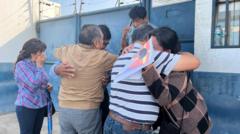A recent protest at Columbia University escalated into a confrontation with police, resulting in the arrest of dozens of pro-Palestinian protesters who occupied Butler Library, igniting discussions about free speech and campus regulations.
Pro-Palestinian Protesters Detained at Columbia University Library

Pro-Palestinian Protesters Detained at Columbia University Library
Over 70 activists arrested as they occupy Butler Library in protest against U.S. policies and university's handling of Palestinian advocacy.
New York City experienced heightened tensions on Wednesday as pro-Palestinian protesters stormed Butler Library at Columbia University, leading to the arrest of over 70 individuals. The event escalated when demonstrators, some masked and adorned with keffiyeh headscarves, breached security in the library, prompting intervention from the New York Police Department (NYPD). University President Claire Shipman condemned the protests, characterizing them as "outrageous" and highlighting that two security officers were injured during the occupation.
Footage shared via social media depicted protesters chanting slogans and vandalizing bookshelves with messages such as "free Palestine." A tense standoff ensued as public safety officials attempted to manage the situation, requiring those inside to identify themselves or face arrest. Shipman emphasized that the protest hindered students' academic pursuits as they prepared for final exams.
In her response, Shipman confirmed that many protesters were not affiliated with the university, which led to calls for NYPD assistance. New York Mayor Eric Adams joined in condemning the unrest, affirming that any form of hate or violence would not be tolerated. In online posts, the activists accused the university of oppressive conduct and refused to comply with ID checks imposed by campus security.
The event marked a significant moment, being one of the first occasions Columbia requested NYPD involvement for an on-campus protest since early 2024. Previously, Columbia faced scrutiny from then-President Donald Trump, who criticized the university's response to antisemitism concerns and threatened to cut federal funding if violations were not addressed.
This incident not only sparked discussions around free speech and academic freedom but also highlighted ongoing tensions regarding U.S. foreign policies in the Middle East and their impact on college campuses across the nation. As debates continue about the rights of students to protest, the implications for university policy and governance remain to be seen.






















